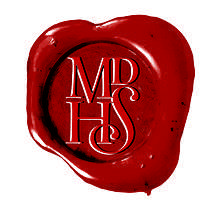Maryland Historical Society
 | |
| Abbreviation | MdHS |
|---|---|
| Formation | March 1, 1844[1] |
| 52-0403670[2] | |
| Legal status | 501(c)(3) nonprofit organization[2] |
| Purpose | Education and historical preservation |
| Location |
|
| Coordinates | Coordinates: 39°17′49″N 76°37′7″W / 39.29694°N 76.61861°W |
| Louise L. Hayman[3] | |
| Mark B. Letzer[4] | |
| Subsidiaries | MHS Monument Street Inc[2] |
Revenue (2014) | $4,164,266[2] |
| Expenses (2014) | $3,398,882[2] |
| Endowment | $12,780,634[2] |
Employees (2013) | 52[2] |
Volunteers (2013) | 98[2] |
| Mission | To promote the understanding and appreciation of Maryland's history and culture.[2] |
| Website |
www |
The Maryland Historical Society (MdHS), founded on March 1, 1844,[1] is the oldest cultural institution in the U.S. state of Maryland. The society "collects, preserves, and interprets objects and materials reflecting Maryland's diverse heritage." MdHS has a museum, library, holds educational programs, and publishes scholarly works on Maryland.
The Society's campus is located in the Mount Vernon neighborhood of Baltimore, Maryland at 201 West Monument Street. This location is the main building of the Maryland Historical Society, which has been housed at the Enoch Pratt House since 1919. The house was originally built in 1847 and was presented to MdHS in 1916 by Ms. Mary Washington Keyser as a tribute to her husband, H. Irvine Keyser who was a member of MdHS from 1873 until his death in 1916. Enoch Pratt (1806-1896) is a well known philanthropist who created the Enoch Pratt Free Library and gave substantial contributions to the First Unitarian Church of Baltimore, the Maryland Science Center, and the Maryland School for the Deaf.
The MdHS has published a quarterly journal, now entering completing its 103 year. The Maryland Historical Magazine is a peer reviewed journal boasting one of the largest readerships among state historical society journals. The society also publishes books on Maryland history that are distributed through a partnership with the Johns Hopkins University Press, including Crime and Punishment in Early Maryland written by former MdHS librarian Raphael Semmes (1890-1952). MdHS has over 100 titles in the Library of Congress.
Notables in exhibition at the MdHS are the original manuscript of the Star-Spangled Banner and the letters and journals of Benjamin Banneker. The MdHS showcases include 231 weapons, 866 pieces of jewelry, 2,200 Native American prehistoric archaeological objects, 15,000 musical scores as well as a remarkable collection of 18th and 19th-century paintings and silver, maritime artifacts, Maryland painted and inlaid furniture, quilts, costumes, ceramics, dolls and toys. Exhibits include Maryland's history, Maryland in art and furniture in Maryland life.
The H. Furlong Baldwin Library’s collections are both diverse and substantive. The library enables researchers, teachers, and students to see for themselves the records of the past, and to study and learn from its many treasures. The library’s collections include 60,000 books, 800,000 photographs, 5 million manuscripts, 6,500 prints and broadsides, 1 million pieces of printed ephemera, extensive genealogy indexes, and more, reflecting the history of Maryland and its people. These collections are accessible to visitors on-line and at the MdHS campus in Baltimore.
On July 9, 2011, Barry Landau and Jason Savedoff were arrested and later indicted for the theft of 60 society documents.
References
- 1 2 "Maryland Historical Society". Business Information. Maryland Department of Assessments and Taxation Business Services. Accessed on April 20, 2016.
- 1 2 3 4 5 6 7 8 9 "Form 990: Return of Organization Exempt from Income Tax". Maryland Historical Society Inc. Guidestar. June 30, 2014.
- ↑ "Board of Trustees". Maryland Historical Society. Accessed on April 20, 2016.
- ↑ "Staff". Maryland Historical Society. Accessed on April 20, 2016.
- "Tradition and Generosity" (special issue). Maryland Historical Magazine. 101, 4. Winter 2006. 467-203.
- "H. Irvine Keyser". Historical marker database Accessed November 21, 2008.
- "Enoch Pratt House". Historical marker database. Accessed November 21, 2008.
- "Publications". Maryland Historical Society. Accessed November 21, 2008.
External links
| Wikimedia Commons has media related to Maryland Historical Society. |